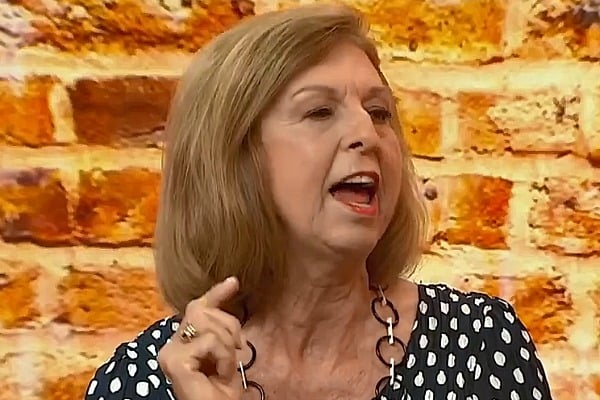
The name Bettina Arndt was once synonymous with sex. In the 1970s, the then-sex therapist was famous for dishing out unabashed advice via the media, touching on anything from foreplay to the female orgasm.
But these days, Bettina has a new headline-baiting passion project: men’s rights activism.
She devotes her time to ‘social commentary’ — YouTube videos, blog and social media posts, media appearances, all geared toward highlighting what she calls “the anti-male feminist agenda”. Whether she’s railing against the #metoo movement or accusing the media of skewing domestic violence statistics to vilify men (more on that later), at the core of her activism is her belief that feminism has simply gone too far.
Watch: Bettina Arndt on being attacked by “desperate” feminists. (Post continues below.)
It’s because of some of those views, that more than 33,000 people have this week signed a Change.org petition calling for Arndt to be removed as a Member of the Order of Australia.

Top Comments
I am one of the many people who signed. Celebrating someone who defends and excuses paedophiles and rapists because they think “ Feminism, in her view, less about empowering women and more about victimhood” is both dangerous and seriously damaging. Nobody wants to be the victim of a crime, to shame and blame them is unforgivable. As for her comments about Julia Gillard not being married or a mother, I’m not sure what world she lives in but nowhere is it written you have to be a mother or wife. We should celebrate all women and from someone who called themselves a feminist once and complained it wasn’t about empowering women but creating victims, this is a massive contradiction. She’s not a social commentator, a feminist, an advocate or even a decent human being, she’s a disgrace. This should not have been not ever been awarded.
That woman is a provocative fool- sort like Mark Latham.
There is grains of truth in some of what she says - ie domestic violence is often a dynamic between two dysfunctional people ( lived that myself ) and I do wonder if she has been sexually assaulted/abused herself as a victim myself I find when people make it bigger then what it is ( asking for death penalty for example) is actually more damaging then the act itself- as it’s telling you something that was unpleasant at the time is so so bad s and you are so damaged you may as well be dead. This is not helpful at all.
I kind of agree that once people have done time they should be able to get in with things- people need a chance to be useful members if society again.
BUT- she is clearly nuts. That interview with Bester was bloody creepy. And campus rapes? What would she bloody know? People don’t make that stuff up to ruin men’s lives.
She’s a provocative fool who loses credibility by deliberately being controversial.
Unfortunately, some women do make 'stuff' up in order to ruin a man's life. People are flawed individuals and can be motivated by revenge, anger and malice. Any allegation of rape occuring on a university campus should be investigated by the police as it is a legal matter.
Yep. She's defending paedos and rapists. And as we know men commit 95% plus of all violent crime. Inarguable. Fact.
Well, that 95% stat is rubbish for a start. So much for “fact”. Please source it...
Because the male-dominated police force has traditionally handled that fairly, said no woman ever..